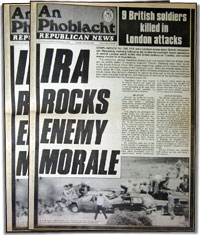19 July 2007 Edition
Remembering the Past

IRA bombs in London
On Tuesday 20 July 1982 the IRA brought the war to the heart of London in a devastating double attack. The first attack occurred at 10.40am. A detachment of the Blues and Royals Regiment, freshly returned from the Falklands/Malvinas war, had just left Knightsbridge Barracks in central London on their way to Buckingham Palace for the Changing of the Guard ceremony.Reaching Regent’s Park they drew level with a blue Morris saloon containing an IRA radio-controlled bomb. A Volunteer detonated the bomb, killing two soldiers outright and seriously wounding another four, one of whom later died as a result of his injuries.
Two hours later the IRA struck again. At 12.55pm, 20 minutes into a scheduled performance by the Royal Green Jackets band in Hyde Park, the bandstand exploded. The soldiers were on leave from Belfast where they were stationed at the time. Six of them were killed outright while a further 24 were injured, some very seriously.
In claiming responsibility for the attacks the IRA made reference to the right of self-defence invoked by the British for their murderous Falklands adventure. The IRA said: “Now it is our turn to invoke Article 51 of the United Nations Charter and properly quote all Thatcher’s fine phrases on the rights to self-determination of a people. The Irish people have sovereign and national rights which no task or occupation force can take away.”
Justifying the Falklands/ Malvinas war, Thatcher had said:
“You have to be prepared to defend the things in which you believe and be prepared to use force if that is the only way to secure the future of liberty and self-determination.”
The British tabloid press, who had so recently gloated with headlines such as “Gotcha” in reference to the sinking of an Argentine hospital ship, the Belgrano, and the drowning of hundreds of wounded Argentine soldiers, went berserk. Headlines such as “IRA Massacre” and “All the Queen’s Horses and all the Queen’s men” abounded.
The hysterical tabloid reaction was matched by vociferous political condemnation by both the London and Dublin governments. Thatcher said – with no sense of irony – “These cowardly and callous crimes have been committed by evil men who know nothing of democracy” while Charles Haughey said those responsible “damage the good name of Ireland”. All of this was in stark contrast to the deafening silence which nearly always followed British outrages such as the murder by plastic bullet of 11 year old Stephen McConomy the previous April.
IRA bombs exploded in London 25 years ago this week.


